- Home
- Paul Fraser Collard
THE REBEL KILLER
THE REBEL KILLER Read online
Copyright © 2018 Paul Fraser Collard
The right of Paul Fraser Collard to be identified as the Author of the Work has been asserted by him in accordance with the Copyright, Designs and Patents Act 1988.
Apart from any use permitted under UK copyright law, this publication may only be reproduced, stored, or transmitted, in any form, or by any means, with prior permission in writing of the publishers or, in the case of reprographic production, in accordance with the terms of licences issued by the Copyright Licensing Agency.
First published as an Ebook by Headline Publishing Group in 2018
All characters – other than the obvious historical figures – in this publication are fictitious and any resemblance to real persons, living or dead, is purely coincidental.
Cataloguing in Publication Data is available from the British Library
Ebook conversion by Avon DataSet Ltd, Bidford-on-Avon, Warwickshire
eISBN: 978 1 4722 3908 2
Jacket design: www.mulcaheydesign.com
Illustration © www.collaborationJS.com
HEADLINE PUBLISHING GROUP
An Hachette UK Company
Carmelite House
50 Victoria Embankment
London EC4Y 0DZ
www.headline.co.uk
www.hachette.co.uk
Contents
Title Page
Copyright Page
About Paul Fraser Collard
About the Book
Also by Paul Fraser Collard
Dedication
Praise
Acknowledgments
Glossary
Map – The Eastern United States 1862
Chapter One
Chapter Two
Chapter Three
Chapter Four
Chapter Five
Chapter Six
Chapter Seven
Chapter Eight
Chapter Nine
Chapter Ten
Chapter Eleven
Chapter Twelve
Chapter Thirteen
Chapter Fourteen
Chapter Fifteen
Chapter Sixteen
Chapter Seventeen
Chapter Eighteen
Chapter Nineteen
Chapter Twenty
Chapter Twenty-one
Chapter Twenty-two
Chapter Twenty-three
Chapter Twenty-four
Chapter Twenty-five
Chapter Twenty-six
Chapter Twenty-seven
Chapter Twenty-eight
Chapter Twenty-nine
Chapter Thirty
Chapter Thirty-one
Chapter Thirty-two
Chapter Thirty-three
Chapter Thirty-four
Chapter Thirty-five
Chapter Thirty-six
Chapter Thirty-seven
Chapter Thirty-eight
Chapter Thirty-nine
Chapter Forty
Chapter Forty-one
Chapter Forty-two
Chapter Forty-three
Chapter Forty-four
Chapter Forty-five
Chapter Forty-six
Chapter Forty-seven
Chapter Forty-eight
Chapter Forty-nine
Chapter Fifty
Chapter Fifty-one
Chapter Fifty-two
Epilogue
Historical Note
Paul’s love of military history started at an early age. A childhood spent watching films like Waterloo and Zulu whilst reading Sharpe, Flashman and the occasional Commando comic gave him a desire to know more of the men who fought in the great wars of the nineteenth and twentieth centuries. This fascination led to a motivation to write and his series of novels featuring the brutally courageous Victorian rogue and imposter Jack Lark burst into life in 2013. Since then Paul has continued to write, developing the Jack Lark series to great acclaim.
To find out more about Paul and his novels visit www.paulfrasercollard.com or find him on Twitter @pfcollard
Fighting for the Union gave Jack Lark purpose. But America is tearing itself apart and no one will be left in peace.
Virginia, 1861. With his comrades defeated, Jack turns his back on the battlefield. At heart he’s still a soldier, but this wholly uncivil war has left him wanting something – and someone – more. Lost in the woods with the Confederate army closing in, Jack will stop at nothing to protect Rose and the future they might share.
Then one bullet changes everything and Jack wakes up in a military hospital – alone. Broken but determined, he sets out on an epic journey across the Confederacy disguised in the grey coat of his one-time enemy. He will find the man who destroyed his life. Jack Lark is out for revenge.
By Paul Fraser Collard
The Scarlet Thief
The Maharajah’s General
The Devil’s Assassin
The Lone Warrior
The Last Legionnaire
The True Soldier
The Rebel Killer
Digital Short Stories
Jack Lark: Rogue
Jack Lark: Recruit
Jack Lark: Redcoat
The Jack Lark Library
(short story omnibus including prequel story, Rascal)
To Alec and Sybil Swan
Praise for Paul Fraser Collard and the Jack Lark series:
‘Collard . . . evokes the horror of that era with great brio. Enthralling’ The Times
‘Nobody writing today depicts the chaos, terror and brutality of war better’ Matthew Harffy
‘Brilliant’ Bernard Cornwell
‘An appealing and formidable hero’ Sunday Express magazine
‘I love a writer who wears his history lightly enough for the story he’s telling to blaze across the pages like this. Jack Lark is an unforgettable new hero’ Anthony Riches
‘Races along with the speed of a bullet fired from an Enfield rifle’ Historical Novel Society
‘This is the first book in years I have enjoyed that much that I had to go back and read it again immediately’ Parmenion Books
‘Collard is to be congratulated for producing a confidant, rich and exciting novel that gave me all the ingredients I would want for a historical adventure of the highest order’ For Winter Nights
‘This is a fresh take on what could become a hackneyed subject, but in Fraser Collard’s hands is anything but’ Good Book Guide
‘This is what good historical fiction should do – take the dry dusty facts from history books and tell the story of the men and women who lived through them – and Collard does this admirably’ Our Books Reviews
I enjoy writing the Jack Lark stories immensely. However, they are not my work alone, and I am incredibly fortunate to have the assistance of three talented people to help me. The first, my agent David Headley, supports me at all times and I can never thank him enough for everything that he does. My editor, Frankie Edwards at Headline, is simply brilliant, and her enthusiastic and knowledgeable input makes these novels so much better than I could ever hope to make them by myself. Finally, Jane Selley has the unenviable task of copyediting my manuscript and making it into something more readable, and I must thank her for the work she does.
As ever, my final thanks goes to my family, and in particular to my wonderful wife, Debbie.
abatis fortification made of felled trees laid lengthwise and facing outwards
antebellum existing prior to the US Civil War
bint British Army slang for a girl or woman
broadside single-sheet advertisement
carbine shortened musket usually used by cavalry
columbiad large-calibre muzzle-loading cannon
corned London slang for being drunk
Jac
k Sheppard infamous eighteenth-century thief
lucifers matches
pannie London slang for burglary
picket sentry
rhino London slang for money
rookery city slum
secher Northern slang for someone from the South who supported succession
talwar curved native sword
turnpike road on which a toll was collected
Virginia, 22 July 1861
Silence lay over the battlefield like a shroud. The man dressed in the uniform of a Union army officer crept through the early-morning mist like a ghost. He picked his way through the detritus of the fight with care, fearing the noise he would make if he were clumsy enough to kick a fallen musket, or any of the other thousands of items of military equipment strewn across the Virginian grassland that bordered the Bull Run river.
He paused, every muscle tensed, as he heard the sounds of soldiers. It was a reminder that he was treading on ice, not just bloodstained and powder-scorched grass. He waited, concentrating on the noises. The soldiers were close, but not so close as to allow him to be seen.
The mist wrapped around him as he waited, something more than just its cool touch making him shiver. He did not move off immediately. Another sound had emerged from the hushed morning air, the soft groans barely audible above the rasp of his own breathing.
‘Help me.’
The words were spoken clearly, and the officer placed their source immediately, the owner of the voice no more than half a dozen yards to his left.
‘Please. Help me.’
They came again, more urgent now, the voice cracking as the plea was repeated.
The officer did not move. He was not there to offer mercy. His nose twitched. The smell of burnt powder lingered, the whiff of rotten eggs present ever since he had left his shelter. And now he caught the taint of something else in the damp air. It was a familiar smell, one as common to his trade as the odour of sawdust was to a carpenter. The officer had smelt enough old blood and torn flesh to know what lay hidden in the mist.
‘Please. Help me. I beg you.’ The voice had changed. Desperation and pain now underscored the words. And there was fear too, the terror only the soon-to-be-dead could know making itself heard in the earnest appeal.
The officer turned his back and moved away quietly, noting the position of the voice only so as to be able to steer a course around it. He felt nothing. There was no shame in leaving. The voice belonged to a stranger, not to a friend or comrade.
He moved more quickly now and his boots scuffed against a fallen ammunition pouch. He kept low, his left hand held out in front of him like a blind man feeling his way forward. His other hand hovered over the holster on his right hip, its flap unbuttoned, the weapon inside cleaned and loaded. He had prepared for this scouting mission as he would for a day of battle. For he was far from home, and far from the men whose side he had chosen. Only a fool faced such a situation without a loaded and primed weapon, and a mind that was ready to use it without thought of compassion.
The mist thinned as the ground under his boots inclined. He slowed, snuffling the air like a hound sniffing a distant fox. The fetid miasma of putrid flesh caught in the back of his throat. It was strong enough to make him want to spit.
Ahead he saw the source of such a foul odour. The corpses lay in a line, their limbs twisted into the obscene shapes only the dead could make. The line stretched on for a hundred yards before its furthest reaches were lost in a denser patch of mist.
The officer recognised the formation of the dead soldiers well enough. The men had been fighting in line of battle, the double-rank formation in which they faced the enemy. The bodies he now looked at were what remained when the survivors had moved away. They lay where the line had fought, their deaths marking the ground where men had fired volleys that could gut an enemy unit in minutes.
He did not try to tally the numbers of the dead, but there had to be at least fifty corpses on ground stained black by their blood. He ran his eyes over the bloated flesh, looking only for a threat. There was no horror at the sight, or widening of the eyes as they gazed upon mutilated flesh and ripped, limbless bodies. It was a sight he had seen on a dozen battlefields, and it looked the same on every continent. Death was death. War was war. He had seen too much of both to be horrified by the sight of the broken bodies.
‘Who’s there?’
The officer squatted low the moment the challenge came at him. He cursed under his breath, a moment’s annoyance at having been seen, then went totally still, his senses reaching out to locate the picket who had spied him.
‘Show yourself.’
There was little conviction in the sentry’s demand. The officer heard the weariness in the voice and understood it well enough. The previous day had witnessed a battle the likes of which had never been seen before on American soil. The army of the Union had attacked hard, their ambitious flanking manoeuvre eventually crushed by a Confederate army that had refused to recognise when it was nearly beaten. The officer understood the sentry’s exhaustion, for he felt it himself. He had fought for the North, for those seeking to preserve the Union. Like the rest of his chosen army, he had ended the day in flight, his companions killed or otherwise lost to him. Save for one.
‘Show yourself or I’ll shoot.’
The last demand came with more authority. It allowed the officer to place the sentry. Still crouched, he set off, moving briskly, his tired muscles tensed, ready for the threatened shot. It never came. He was not surprised. Even the most anxious picket would hesitate to fire on a single shadow.
The mist thinned as he retraced his steps. Yesterday had been stiflingly hot, and already today promised to be little different. He could feel the heat beginning to build, the sudorific air already starting to press down on the scarred earth that had been chosen by the generals as the field of battle. The mist that sheltered him would not last for long.
The barn that had been his refuge overnight loomed into view. When he had left it just under half an hour earlier, he could see little more than the doorway. Now the whole thing was visible, a reminder that it was time to leave.
‘Rose, are you there?’ The officer paused at the door and hissed the question. He might have been dressed in the uniform of the Union army, but his accent came straight from the streets of east London.
‘Yes.’ The reply was almost instant. Rose stepped into the doorway, a mocking smile on her face. ‘Did you think I would’ve left all by my lonesome?’
‘I wouldn’t put it past you,’ the officer answered, no hint of a smile on his lips. He saw her scowl as she spotted his tension. It was a rare expression. Rose would more often mock than berate; tease when others would complain. It was one of the things he liked about her. The fact that she was pretty merely added to her attraction. At that moment, there was a hint of pink on the tips of her cheekbones, the colour sitting well on her dark skin. Her hair was pulled back, its soft curls tied into a purposeful ponytail. She usually wore it loose, letting it wrap around her face so that it hid the scars that marred one side of her jaw. Now she faced him with her disfigurement on show. She no longer had reason to hide anything from him.
He glanced over his shoulder, wary now that the sun was burning away the mist, then pulled his companion back into the barn and out of sight.
‘What did you find?’ Rose asked the question quietly, sensitive to his mood.
‘They’re still all around us. We need to get moving.’
‘So be it.’ She nodded as she replied. There was no hesitation. She accepted his decision without a murmur. ‘We cannot stay here. Those sechers will want the fodder. Are you up to this?’
The officer scowled at the doubt in her tone. ‘I’m fine.’
‘Are you sure?’ Rose stepped closer to him. He towered over her, and she was forced to crane her neck back as she considered his face. She smiled, then lifted her right hand so that she could brush her fingers across his cheek. There they lingered, tracing the th
ick scar that ran across the left-hand side of his face. It had been left by a mutinous sawar’s sword outside the walls of Delhi four years earlier and was a reminder of failure, of the moment when a woman he had come to care for had been snatched away from him, never to return. It was one of the dark memories, one of the demons that he kept locked and chained in the recesses of his mind where he refused to venture.
‘Let’s get going.’ There was a harsh quality to his voice now.
‘I’m ready.’ Rose smiled as she heard censure in his tone. ‘What are we waiting for?’
The officer bit back a brusque reply. It would be easier if he were on his own, if he didn’t have Rose to consider. He was used to fending for himself. He was a wanderer, a man with neither home nor family, his connections in the world little more than fleeting gossamer-thin strands that could be broken at a moment’s notice. Yet now he was saddled with a woman. The choices he would make were no longer his alone, and such a complication would surely only serve to make his life harder.
‘You can go on without me if you like.’ Rose took a pace backwards as if she read his thoughts. ‘I can look after myself. I’ve done it before; I can do it again.’
The officer looked at her sharply. He saw no fear on her face as she suggested that he abandon her. It was a reminder of what had drawn him to this former slave turned housemaid. There was a spark deep in her eyes and devilment in her gaze. She was a challenge that he had been unable to ignore.
‘No.’ He spoke quietly and reached his hand out towards her. ‘We’ll walk our chalk together.’
‘We’ll do what exactly?’
He nearly smiled at her reaction. It was a common enough phrase on the streets of Whitechapel, where he had been brought up, but he was a long way from there, so he tried again. ‘We’ll go together.’
‘You’d better speak clear, else it’ll be a long, hard day.’ She took his hand as she delivered the rebuke.
‘Yes, ma’am.’ He squeezed her hand in reassurance. There was nothing else to say.
He led the way outside and into the last of the mist. His early-morning excursion had given him a fair idea where the closest Confederate troops were. He paused, taking one last moment to summon a plan. He thought about discarding the uniform he was wearing. It was the dark blue chosen by his regiment, the 1st Boston Volunteer Militia. Many of the Union regiments had decided upon a different uniform, the army fighting its first major engagement with many of its soldiers not able to tell friend from foe. This self-created confusion was just one of the many mistakes the inexperienced soldiers had made that day.

 THE REBEL KILLER
THE REBEL KILLER The Lost Outlaw
The Lost Outlaw Jack Lark: Recruit (A Jack Lark Short Story)
Jack Lark: Recruit (A Jack Lark Short Story) The Devil's Assassin (Jack Lark)
The Devil's Assassin (Jack Lark) The Last Legionnaire
The Last Legionnaire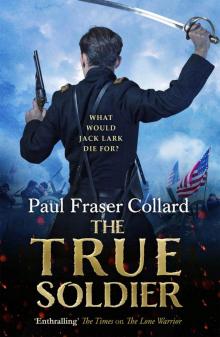 The True Soldier: Jack Lark 6
The True Soldier: Jack Lark 6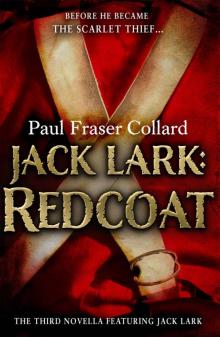 Jack Lark: Redcoat (A Jack Lark Short Story)
Jack Lark: Redcoat (A Jack Lark Short Story)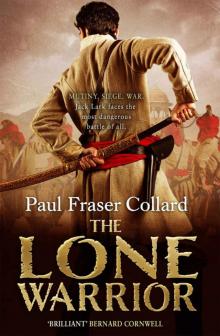 The Lone Warrior
The Lone Warrior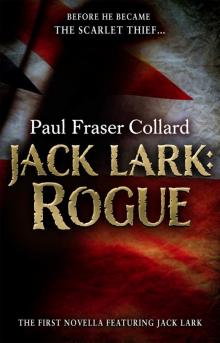 Jack Lark: Rogue
Jack Lark: Rogue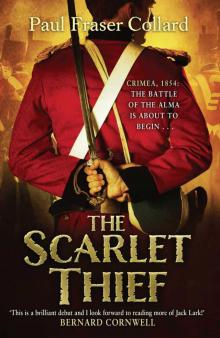 The Scarlet Thief
The Scarlet Thief